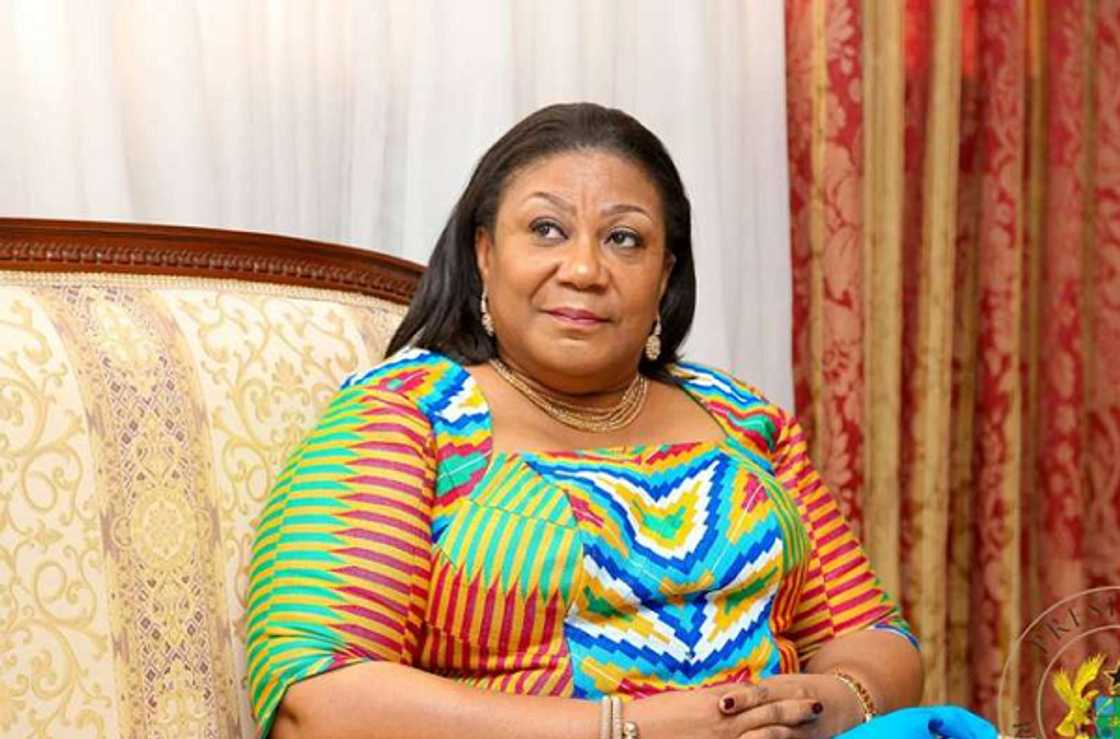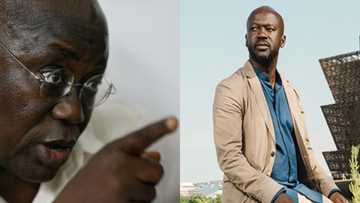International Women’s Day: First Lady wants women to be more respected in society
- Rebecca Akufo-Addo has called for inclusiveness for all women and girls
- The First Lady has issues a public statement to mark International Woman's Day
- Ghana is respected across Africa for contributions to improve the lot of women and girls
Our manifesto: This is what YEN.com.gh believes in
The First Lady, Rebecca Akufo-Addo, has called on opinion leaders as well as government to hold dear the matters of women and girls in the country.
As Ghana joins the rest of the world to mark International Women's Day, Rebeca Akufo-Addo stated that even though much has been done to ensure equality, the Coronavirus Pandemic further impresses on Ghana to do more for sustainable growth.

Source: Facebook
Below is her full statement:
Once again the International Women's Day is here, presenting the global opportunity to celebrate the social, economic, cultural and political achievements of women, the world over.
Marked annually, on March 8, the International Women's Day (IWD) is one of the most important events on the United Nations’ calendar, which makes it possible to raise awareness on women's equality, achievements, and challenges, as well as lobby for accelerated gender parity.
The Day, sanctioned by the United Nations (UN) in 1975, when it officially celebrated it, inspires support for organisations that help women, globally, and creates the opportunity to fundraise for female-focused charities
The 2021 theme for the IWD, announced by the UN Women, is: “Women in Leadership: Achieving an Equal Future in a COVID-19 World”, which celebrates efforts by women and girls in creating a more equal future and COVID-19 pandemic recovery.
However, there is a parallel global campaign theme: “#ChooseToChallenge,” highlighting the importance of challenging biases and misconceptions in the interest of creating a more inclusive and gender-equal world.
The celebration of the International Women’s Day continues to be very relevant because of the many issues concerning women and girls that deserve to be highlighted and given the requisite attention.
Ghana, commended by the World Health Organisation for her resilience in the fight against the Covid-19 pandemic, is making her presence felt amidst the prevailing challenges by using the occasion to focus on the effects of the pandemic on women and girls and map out strategies to ease their suffering.

Read also
Int'l Women’s Day: Barriers to females entering Engineering must be removed – Ing. Carlien Bou-Chedid
This is critical because right from the onset of the pandemic, around the end of 2019, women have been identified as front-liners in managing the crisis, in their role as healthcare workers, caregivers, innovators, and community organisers, among others.
Many of them have also been recognised as most exemplary national leaders in combating the disease, with a majority demonstrating their skills, knowledge and networks to effectively lead in the response and recovery efforts.
That, notwithstanding, the UN Women report indicates that women across the world are facing increased domestic violence, unpaid care duties, unemployment and poverty due to the pandemic and that despite women making up a majority of frontline workers, there is disproportionate and inadequate representation of women in the national and global COVID-19 policy space.
The pandemic is known to affect everyone everywhere, but impacts different groups of people differently, deepening existing inequalities. We must, therefore, join efforts to adopt pragmatic measures to help close these inequalities.
This is important because even though earlier data indicated that the mortality rates from COVID-19 may be higher for men other reports say the pandemic is having devastating social and economic consequences on more women and girls. This is because nearly 60 per cent of women work in the informal economy, earning less, saving less, and at greater risk of falling into poverty.
Again, as markets fall and businesses close, evidence abounds that millions of women’s jobs are disappearing, while most of them continue to lose paid employment, forcing them to engage in unpaid care work due to the exigencies of the times, including school closures and the increased care for the aged.
It is worth mentioning that apart from Ghana, and the other countries, whose male presidents have been praised for controlling and managing the pandemic with strategic interventions and policies, majority of the countries that have been successful in stemming the tide are said to be headed by women. We, therefore, salute the leaders of Ethiopia, New Zealand, Germany, Finland, Denmark, Slovakia and the others, for making us proud.
They have demonstrated that despite the new barriers brought by the pandemic to compound the pre-existing social and systemic challenges that women face in their bid to participate in the leadership arena, working together around the campaign theme: “#ChooseToChallenge,” would help in changing the status quo of biases and stereotyping that impede achieving gender equality.
The UN cautions that the multiple obstacles that remain unchanged - the devaluation of women and girls in some societies, the fewer choices, and experiences of all forms of violence, especially around the COVID-19 period, are threatening hard-won gains.
For instance, global statistics, as of 2019, indicated that legal restrictions had kept 2.7 billion women from accessing the same choice of jobs as men, while less than 25 per cent of parliamentarians were women.
It is so imperative that women from all walks of life heed the clarion call to continually support women’s tireless efforts at bringing different expertise, experiences, perspectives and skills to the table, and make concrete contributions to decisions, policies and laws that work better for all.
Also of great importance is the need to uphold the rights and fully leverage the potentials of women leaders in pandemic preparedness, response, and recovery. The perspectives of women and girls, in all of their diversity, must be integrated in the formulation and implementation of policies and programmes in all spheres to attain the desired results.
Efforts must be made to disseminate information on how women’s immunity and ability to fight the COVID-19 can be boosted by adopting healthy lifestyles and eating more nutritious locally produced foods as well as exercising and keeping to the safety protocols.
Women must be champions and facilitators of the drive to have a head immunity against Covid-19, as they have admirably done through the years, to overcome previous pandemics.
Also, women in the urban and the rural areas need to be supported based on their needs assessments.
Thus the call on governments, especially in Africa, to ensure that girls stay in school, irrespective of the extended school closures, and protected from all forms of abuses and early marriages is in the right direction.
Reports of increased violence against women, attributed to the consequences of the pandemic, must be investigated and stopped through proper social counselling and monitoring programmes as well as support services to safeguard our females.
The needs of women rightly deserve to be placed at the heart of the COVID-19 response measures, while socio-economic plans are redesigned purposefully to better the lives and futures of women and girls.
Everyone must daily make a conscious effort in thought, speech and action towards the achievement of gender parity, sooner than later, in defeat of the World Economic Forum’s prediction that 'none of us will see gender parity in our lifetimes, nor likely will many of our children.’ Working for a sweet victory, with a ripple effect in the interest of all, must be the common agenda.
Indeed, building an inclusive and resilient society in tandem with the attainment of the Sustainable Development Goals and achievement of the 2021 IWD theme, calls for unity and focus, both by women and men in Ghana and yonder.
A challenged world is, indeed, an alert world. Therefore, everyone must truly embrace the challenge by making the International Women’s Day the focal point to contribute their quota, actively, to make a positive difference for women.
The day belongs to all groups, collectively, everywhere. Gloria Steinem, the world renowned feminist, journalist and activist, aptly asserts: “The story for women’s struggle for equality belongs to no single feminist, nor to any one organisation, but to the collective efforts of all who care about human rights.”
Join YEN.com.gh's Telegram channel!
Never miss important updates
Download YEN's news app on Google Play now and stay up-to-date with major Ghana news.
Source: YEN.com.gh




